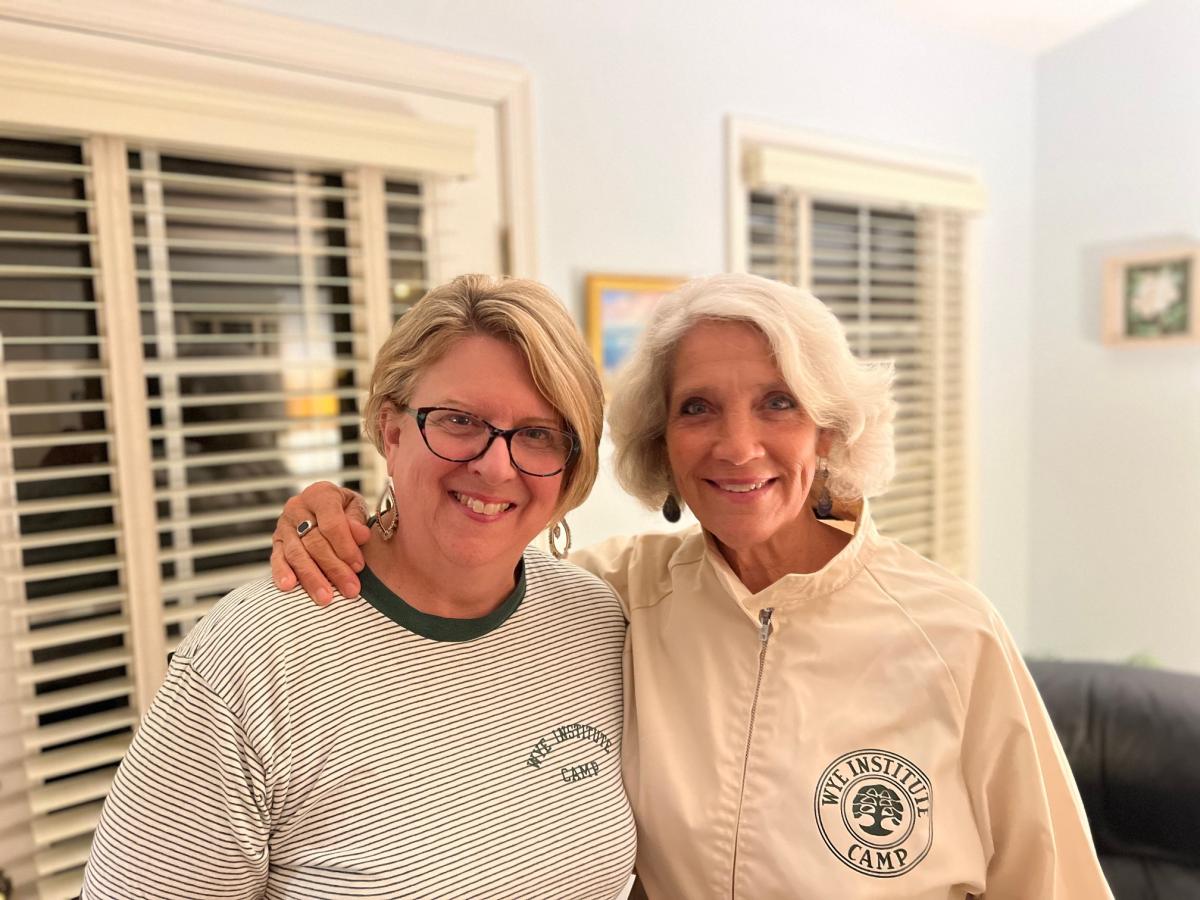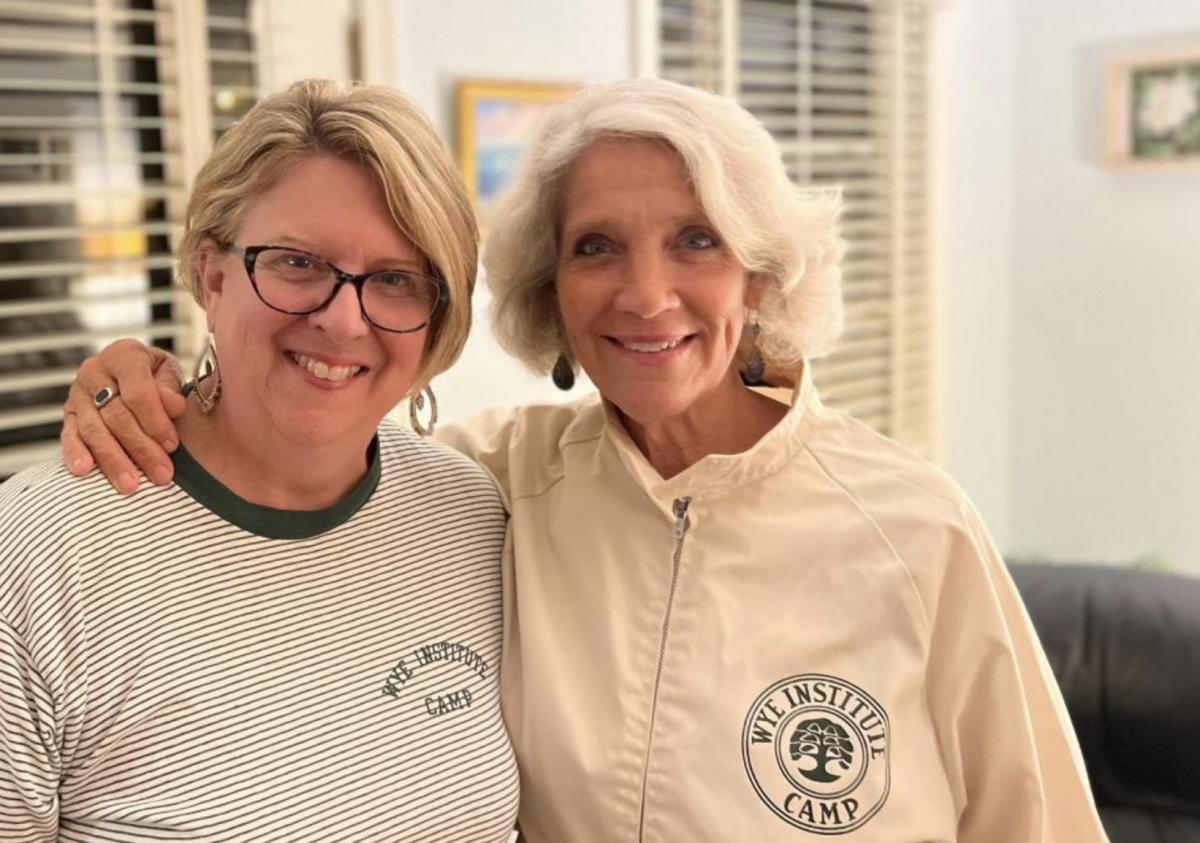
Pictured left to right are Judy Stagg Kusuma and Amelia Blades Steward in their original Wye Institute camp uniforms from 48 years ago. The two met as campers at Wye Institute in 1974 and have remained lifelong friends.
When my parents dropped me off at Wye Institute in Queenstown, Maryland in August 1974, little did I know the impact that four weeks of summer camp would have on both my career as a writer and lifelong friendships.
Industrial magnate Arthur A. Houghton Jr. bought 1000 acres of property on the Wye River in 1938 to become a gathering place where ideas and innovations evolved. In 1963, Houghton established the foundation, Wye Institute, expanding his philanthropic interests to stimulate educational, cultural and economic opportunities in the region. He built contemporary facilities at Wye Woods to launch a summer educational camp for middle school boys designed to promote civil understanding and in Arthur’s words, “stir the imagination of extraordinarily promising young persons” from Maryland’s Eastern Shore. The camp was integrated and eventually included girls—open to all students regardless of race, religion or ethnic origin.
When I arrived at camp in 1974, the girls stayed at Gunston in Centreville, while the boys stayed at Wye Institute. We all gathered at Wye Institute during the daytime hours for camp programming. The campers were from Maryland’s Eastern Shore and from the Finger Lakes region of upstate New York where Houghton made his fortune with Steuben Glass Works, a subsidiary of his family’s company Corning Glass. Many of us were from very moderate-income families – we didn’t have a lot. This camp experience was a gift to all of us.
Some of my memories include participating in a social experiment in downtown Centreville where some of us walked around with war paint on our faces while others walked around without any makeup. We observed how the two groups were treated. Another memory was seeing the Houghtons’ sea lion who lived at Wye Woods. We attended plays and read Greek mythology. We played music, participated in theatre and wrote creative fiction. I met my best friend there, Judy Stagg Kusuma. She was from Snow Hill and I was from Easton. Her family was moving to Easton at the end of that summer for her dad’s new job as superintendent of the Hog Neck Golf Course. Our sisterhood was formed that summer and she is still my best friend today.
But it is the personal connections I have had to the property since my time as a camper at Wye Institute that have been so serendipitous. The first connection happened in 2004 when I was asked to write an article on Leon Andrus, the benefactor who started Adkins Arboretum in Ridgely. It turns out that Andrus owned Cheston-on-Wye, adjacent to Arthur Houghton’s Wye Plantation. Andrus bought some of Houghton’s Black Angus cattle and my grandfather was his herdsman – something I never knew until I talked with my mother while writing the story. Later, writing copy for the Harry R. Hughes Center for Agro-Ecology, located at Wye Plantation, I was able to bring my mother to visit the tenant house where she was born at Cheston-on-Wye – a very special experience for her and me and another connection to this beautiful property. Most recently in 2019, I was asked to write a DVD booklet on the history of Wye Plantation to accompany a film, “Escape to Aspen Wye,” created by Aspen Institute to help sell the property. I found my Wye Institute jacket and tee-shirt while cleaning out some clothes that year and was able to share them when I was interviewed for the film as one of the campers who attended the Wye Institute.
I love how everything comes full circle if we wait long enough. While I don’t know the meaning of all of these connections to this special property on the Wye River, I know that its impact on my story is significant and not an accident. Recently, I was thrilled to hear that the 166-acre Wye River Conference Center property was donated by Aspen Institute to become a Hole in the Wall Gang Camp for children with serious illnesses and their families in the Mid-Atlantic region. The property will once again help transform the lives of children. What a wonderful legacy to leave for the future. Aspen Institute’s gift pays forward the gift of Mr. and Mrs. Arthur Houghton in 1979 when they donated the property to Aspen Institute.
Amelia Blades Steward has written non-fiction articles for national, regional, and local publications for over 30 years. A lifelong storyteller, she published her first book in 2014, a memoir entitled “Charles H. Thornton: A Life of Elegant Solutions.”



Wilson Wyatt says
Wonderful story…and what a special connection to the author of this piece and to others on the Eastern Shore. We have so much to look forward to with the coming of the camp for the Hole in the Wall Gang. If there is anything we can do for the camp program at the Delmarva Review, count us in!
Maggie. Jarboe says
Amy,
What a wonderful article. That is very special that the property will be used for such a good cause.
Margaret Iovino says
Wonderful story. I want to know more of the personal aspect to the property you discovered!
Tracey says
And then there were the Aspen Institute cows staring at us in the dark one night in 2005 for our Shore Leadership experience. We laughed so hard! Great story Amy! Thank you for sharing.